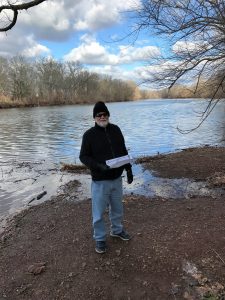 Psalm 17:3-5
Psalm 17:3-5
You have tried my heart, you have visited me by night, you have tested me, and you will find nothing; I have purposed that my mouth will not transgress. With regard to the works of man, by the word of your lips I have avoided the ways of the violent. My steps have held fast to your paths; my feet have not slipped (ESV).
One of the basics about the Christian life is that we have fellowship with God; we share our lives with God. Indeed our fellowship is with the Father and with his Son Jesus Christ (1 John 1:3c ESV). The grace of the Lord Jesus Christ and the love of God and the fellowship of the Holy Spirit be with you all (2 Corinthians 13:14 ESV). We know this, yet I think that we don’t do well in actually sharing our lives with the Lord. Perhaps part of the problem is that we don’t know how. Yes, we we’ve been taught how to have devotions, how to pray, how to read the Bible, how to participate in a public worship service, how to witness, and perhaps how to meditate and how to listen to a sermon. I am not for a moment downplaying the importance of such skills. I would only say that praying, reading, and so on should not be mechanical or ritualistic. But that is not the concern of this article.
Let’s think on a larger level than the particulars. Let’s think about sharing our life, because a passion for one area can easily “eat up” the others. For this, we need a model or example. The Spirit has given us one in David, the man after God’s heart. Our text has several ideas about sharing one’s life with God.
- David knew that God was directly involved with him. He did not live like God was far off. He knew that the Lord visited him by night. As Paul said, “God is actually not far from each one of us” (Acts 17:27 ESV). God is near, close to us, so that we can share our lives with him. God tests us; this might sound scary, until you remember that God is your Father and loves you. The testing is for your benefit.
- David knew the importance of the heart, the inner person. This takes us off the stage of attempting to impress God by what we do. He knows our motives and attitudes and emotions. David, like the writer of Hebrews knew that he stood naked before God. And no creature is hidden from his sight, but all are naked and exposed to the eyes of him to whom we must give account (Hebrews 4:13 ESV). To share life with God, we must want this openness. You can’t share, if you’re trying to hide or avoid.
- David desired to live godly. God is the Holy One, and to share our lives with him, we must purpose to live in conformity with who God is. Our words come from our hearts (Matthew 12:34), and so David sought comprehensive godliness. To share one’s life with God does not simply happen. It requires godly desires that we put into practice. These come from our union with Christ by the Spirit’s help. God wants us to want his way of life.
- David realized that he needed instruction from God’s word. He listened to the word of your lips and his steps held fast to your paths. Notice the personal awareness: the repeated your. As he listened to the word and meditated on it, he made choices to live for God. To say it another way, God was his personal coach or mentor. There is a freeness of exchange between a coach and his athlete. For example, “Here is the correct form you need to make a layup.” A wise athlete will seek feedback from his coach about his or her progress in achieving that form.
- David kept focused on the Lord. He avoided some ways, and held fast to others. The writer of Hebrews urges us to keep our eyes on Jesus (Hebrews 12:2). To share life with God, we must, so to speak, stay close to where he is and avoid where he isn’t. A basketball team is told to put on a full court press. Each player must know where the coach wants them to be and what to do in various contingencies. “You’re responsible for that area of the court.” The players must keep their heads in the game. We can’t share our lives with God if we “check out”. God is “on the court” with us, and we discuss with him how his story is opening up in our lives.
One more thing: David wasn’t talking theory. This was his life. He shared life with God among other people who had no desire to do so. He made the daily choices necessary to be with God and to interact with him about his life. Do we?
Grace and peace, David

 1 Corinthians 12:3
1 Corinthians 12:3 1 Samuel 7:2-13
1 Samuel 7:2-13 1 Samuel 7:2-13
1 Samuel 7:2-13 2 Timothy 1:13
2 Timothy 1:13 Leviticus 9
Leviticus 9 1 Corinthians 12:3
1 Corinthians 12:3 Matthew 6:34
Matthew 6:34